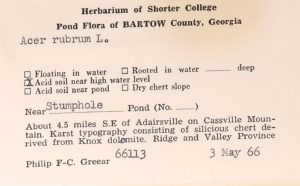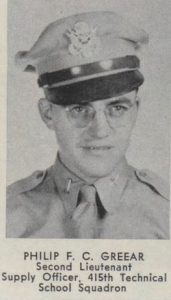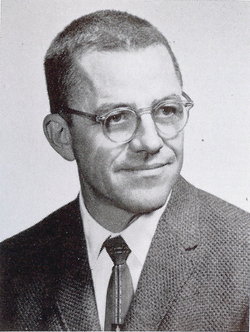(24 August 1918 – 26 September 2012)
The University of North Carolina at Chapel Hill Herbarium (NCU) curates about 70 vascular plant specimens collected by Philip French-Carson Greear, though as we continue to catalog our holdings it is likely more will be found. Most of Greear’s specimens curated by NCU were collected for his doctoral work on the vegetation of Bartow County, Georgia. He usually used “Philip F-C. Greear” on herbarium labels.

The University of Georgia Herbarium (GA) curates the majority of his specimens (900+) as he earned both his M.A. and Ph.D. degrees at that institution. Other herbaria curating Greear’s vascular plant specimens include Auburn University (AUA), Botanical Research Institute of Texas (BRIT), Carnegie Museum of Natural History (CM), Clemson University (CLEMS), Eastern Kentucky University (EKY), Emory University (GEO), Georgia Southern University (GAS), Harvard Herbaria (GH), Kent State University (KE), Louisiana State University (LSU), Marshall University (MUHW), James F. Matthews Center for Biodiversity Studies (UNCC), Missouri Botanical Garden (MO), Florida State University (FLAS), University of Mississippi (MISS), University of Tennessee (TENN), University of Texas, Austin (TEX), University of Wisconsin, Madison (WIS), and Valdosta State University (VSC). The New York Botanical Garden (NY) and Valdosta State University (VSC) herbaria curate bryophytes collected by Greear. The Shorter College Herbarium (SHOR) was dismantled in December, 2011 and all specimens are on “long-term loan to GA”.3
A search in May, 2021 of herbarium portals devoted to algae, lichen and fungi revealed no specimens collected by Greear.
His obituary was printed in the Gainesville Times on 29 September, 2012:
“Philip F-C Greear, resident of Helen, Ga., died at home on Sept. 26, 2012, at age 94. He is survived by his wife of 69 years, Mildred White Greear; four children, Carol Greear Backus, Delbert Philip Greear, Margaret Greear Oren and Teressa Greear Holtzclaw; 11 grandchildren, Virginia Carstarphen, John T. Carstarphen, Ben Greear, Jake Philip Greear, Cary Greear Ritzler, Dixie Dillon Lane, Jay Leroux Dillon, Corey Isaac Oren, Elise Renee Oren, Troy Carson (T.C.) Holtzclaw and Michael Holtzclaw; and five great-grandchildren, Leah Holtzclaw, Angelina Lazetic-Greear, Jovan Lazetic-Greear, Carl Philip Ritzler and Isaac Ritzler. He was preceded in death by his daughter, Virginia Katherine (Missy) Greear; his parents, John Fields Greear Sr. and Carrie (Caroline) Cox Greear; siblings, John Greear Jr., Jean Greear McGinty, Solomon Cox Greear, James Washington (Josh) Greear and David Greear.
Philip’s parents brought their family from Troutdale, Va. [Grayson County, Virginia], to White County, Ga. [Georgia], in the 1920s, when Philip was eight years old. He attended Nacoochee School through the eleventh grade, then finished high school at Young Harris Academy. He continued his college education at Young Harris College.

After college graduation, Greear joined the U.S. Army in 1942. He soon transferred into the newly formed U.S. Air Force, in Biloxi, Mississippi. There he met Mildred White, a young teacher who taught at Gulfport High School. They married on June 4, 1943. While Philip was in military training, they moved their residency to Helen, Georgia, to be near his parents.
Philip was stationed in Japan post World War II. Mildred and their three children, Carol, Delbert and Virginia Katherine (Missy) joined him there from 1951-1953. After returning to Helen, Philip taught school in White County and later attended the University of Georgia where he earned his Master’s degree in Plant Taxonomy and also, his Ph. D. in Biology with specialization in Botany.
Philip was appointed chairman of the department of biology and earth science at Shorter College in Rome, Ga., from 1962–1985. He rose to prominence nationally as an environmentalist having served on the Board of Directors for the Georgia Conservancy for a number of years as well as being on the Board of Directors for the Nature Conservancy. Greear was drawn to work toward preserving the environment because he had seen much devastation during World War II and because he grew up in the mountains of Northeast Georgia. He was a pioneer in using the Georgia Barrier Islands as an outdoor classroom for teaching Marine Biology and Environmental Science.
The Rev. Robert Prim will conduct a memorial service at Nacoochee Presbyterian Church, Sautee-Nacoochee, Ga., at 11 a.m. on Friday, Oct. 12. The SNCA community center, opposite the church, will be open for casual visiting before the memorial service. The memorial will conclude with dinner in the church reception hall.
In lieu of flowers, memorial donations may be made to: The Nature Conservancy; The Georgia Conservancy; The Ossabaw Island Foundation.”1
Publications:
Greear, Philip French-Carson. 1967. Composition, diversity, and structure of the vegetation of some natural ponds in northwest Georgia. Ph.D. thesis, University of Georgia, Athens.
Greear, Philip French-Carson. 2009. Leaf fall. Published by the author.
Sources:
1. Obituary, Philip French-Carson Greear. “Gainesville Times,” Gainesville, Georgia, USA, September 29, 2012.
2. Dr. Philip French-Carson Greear, Find A Grave memorial # 98036092. https://www.findagrave.com/memorial/98036092/philip-french-carson-greear accessed on 20 May 2021.
3. “Shorter College Herbarium (SHOR)” entry within Index Herbariorum, http://sweetgum.nybg.org/science/ih/herbarium-details/?irn=125936 , accessed on 20 May 2021.
